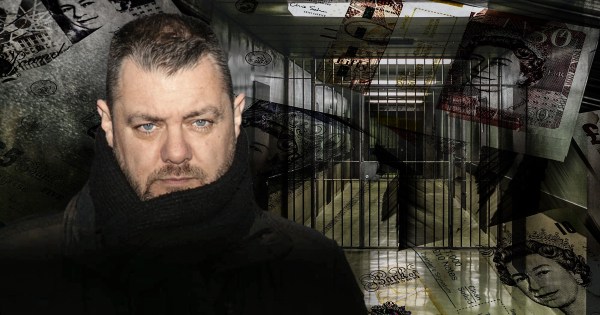

Tony Sales was seven when his uncle lowered him through the window of a pub in Greenwich, south London, so he could unlock the door.
As his uncle thanked him, a smiling Tony watched as he robbed the place. Right then and then, Tony knew a life of crime was the life for him.
‘The feeling was “wow” that I got from it because I’ve made some adults happy,’ Tony, dubbed ‘Britain’s Greatest Fraudster’ by the press, tells Metro.co.uk.
‘And that’s what I’d been searching for. Instantly, I connected crime with a good feeling. I didn’t know any better.’
Tony’s time in crime is varied, to say the least: stealing car radios, shoplifting and credit card cloning, to name a few. He’s been in prison twice.
He didn’t get the title of ‘Britain’s Greatest fraudster’ from five-finger discounts, though. When it comes to fraud, picture it and there’s a high chance Tony’s done it.
What fraud Tony has done is easy enough to answer – but Tony knows the ‘why’ just as well.
‘I was two days old and mum and dad are already not in my life,’ Tony, who when asked how old he is said ‘no comment’, says.

‘My mum gives me to my grandmother to be taken care of. That creates a massive insecurity at a very young age.’
Trauma is something all too familiar for Tony. ‘Sexual abuse, bullying, the domestic violence; all stuff I saw day in and day out for a lot of my childhood,’ he explains.
Tony didn’t want to be ‘Tony’ any more. There had to be another option – and being lowered through that window all those decades ago gave him just that.
‘Once you’re able to really separate yourself into someone else, and truly become that person in the moment and fully follow it through,’ he says, ‘committing crime becomes really easy, especially fraud.
‘I always say that criminals don’t just become criminals.’
A bottle of pop and cigarettes are all Tony asked for when being given a job at first – soon enough, he was pulling off a half-a-million bank heist.
But it wasn’t your usual black sock over-the-head stickup. Tony helped to fleece a bank out of £500,000 by withdrawing from an account that belonged to someone else in the mid-1990s.

A local gang had been slowly siphoning money from a business – an accountant was their insider – they just needed a ‘face’ to swing by the bank and withdraw the stolen cash on behalf of the business.
‘You have to be everything that person believes you are in that moment,’ Tony says. And what Tony was, other than being nicely dressed and spritzed with aftershave, was ‘terrified’.
‘I’ve got the guy [who organised the heist] ringing me. I had a couple of couple of teas, and I’m thinking about my DNA. I’m thinking, s**t, this is going wrong because they kept me waiting for so long,’ Tony recalls.
‘And then the bank tellers come out and gave me half a million quid. They asked me if I wanted to count it. I said no, you lot spent enough time counting as it is. I need to go. By this time, my bum had turned to putty.
‘I got paid handsomely for that – was a good day’s work and a magnificent piece of fraud.’
These days, fraudsters don’t need to sip tea in front of unknowing bank tellers like Tony did. They instead ping texts to phones posing as loved ones with new numbers, push emails pretending to be official government websites, send Instagram DMs offering phoney ‘brand collaborations’, use spoof caller IDs to pretend to be customer service reps and set up fake holiday websites to help people book hotels that don’t exist.
In the last 12 months, nearly three in 10 Britons have fallen victim to a scam, according to the international money transfer app Wise. This is roughly 15,000,000 people.
Over two-fifths have been approached by a scammer. Nearly everyone is a potential target – and people know it, with 85% expecting to be fleeced in the future.
The greatest weapon in a con artist’s arsenal, however? ‘Fear,’ says Arun Tharmarajah, director of European banking at Wise.
Technology too. Arun says: ‘AI, for instance, can be used to impersonate someone’s voice. However, the technology still has a person behind it, and the fundamentals of scams remain largely consistent. Learn these, and you can spot the red flags.’
AI wasn’t an option for Tony in the 2000s – so he had to get creative when he realised identity theft was where the money was. A revelation that came after spending 15 months in a London prison in 2000 for owning an imitation firearm.
He even saw a few familiar faces in the recreational yard: ‘I’d grown up around crime. The same people end up in prison, don’t they?’
Soon enough, he was cloning credit cards, duping people with fake fundraising forms and transferring stolen money onto gift cards without a second thought.

Police questioned Tony later that decade, having spoken to people whose identity Tony had stolen. One of the victims, Tony discovered, was the dead father of a daughter.
‘You’re just doing it. Not thinking about the victims,’ Tony says. ‘It was just a really easy thing to do, you don’t think there’s any victims in it – the 100 names that I would pick every day are 100 victims.’
Hot on his trail, Tony went on the run with his family – including his pregnant wife.
Not only did his wife and children not know Tony was a fraudster, but they had no clue they were even on the run.
‘As far as they were concerned, life was getting better for us,’ Tony explains, saying he would repeatedly upgrade his house before buying another property to move into. By leapfrogging across London, Kent and Essex, Tony managed to be on the lam for six years.
His time as an identity thief – and as a free man – came to an end in 2010 when he was stopped by police on an unrelated matter. When an officer ran his name through the system and found a warrant for his arrest attached, Tony was charged with conspiracy to defraud.
A cell in a Doncaster jail was all Tony knew for 12 months. For three months, he never heard from his wife.

‘When my wife finally comes to visit me in prison, she’d holding my son’s hand,’ Tony says. ‘He was crying, just crying his eyes out. I can tell it the same every time I’ve told it because I can still see it.
‘I realised I’m pushing my trauma onto my own kids. No father wants to do that. You want the best for your kids and I realised I made a load of mistakes. How do I make them proud?’
‘When I went to jail, their dad had just been snatched away from them. They don’t know anything. Still to this day, the kids suffer from it.’
When Tony was released, he had yet another post-prison revelation. He didn’t want to be a fraudster, he wanted to prevent it. Something his coach at the Job Centre didn’t exactly believe he’d ever do.
‘I felt I’ve had a massive mountain to climb. I looked around and could see how they didn’t know about this thing or that bit yet. I was able to spot stuff that I would use as a fraudster.’

Tony got a job at a Nisa grocery store and between shifts worked on presentations to show finance sector leaders at conferences. He even spoke with Vice in 2011 about his time as a fraudster, telling them how he raised £200,000 to pay off the drug dealers hounding his friend, which helped him go ‘viral’.
Now at the ripe age of ‘old’ (that’s Tony’s word) Tony is the chief product officer at We Fight Fraud (WFF), a financial crime prevention group. He advises government officials, police and financial firms on fraud and cybercrime.
‘Every single time I did [a scam], it was for elation,’ the Big Con: How I Stole £30 Million And Got Away with It author says. ‘I still get to do it today. Businesses pay me to test their security processes.’
The WFF is supporting Wise to launch the Royal Academy of Scamatic Arts, or ‘RASA’, to teach online pupils scamming 101. Just like Tony does today, however, it’s all so people know scams just as well as the swindlers themselves so can spot the red flags.
‘That way you can hopefully arm yourself and be able to defend back against it,’ he says.
What are the scam red flags people should look out for?
Wise’s Arun Tharmarajah is pretty, well, wise to scams. Here are his top three red flags for spotting a scam:
‘First, are you being put under time pressure? A scammer will try to rush you into making a decision. They might say it’s a limited-time offer, or that there are consequences if you don’t do what they say soon.
‘It’s a cliche but be wary of offers that are too good to be true. Whether that’s an investment scam promising unreal returns, or a stunning short stay flat at an amazing price when Taylor Swift is in town.
‘And finally, is the person trying to make you pay away from a legitimate platform.
‘So, on the Taylor Swift short stay flat, are they asking you to transfer money directly rather than pay via the likes of Airbnb or Booking.com? If so, that’s a red flag.’
Take online fraud. The internet is the wild west for shysters, where usernames and passwords are just one hack or security breach away to be sold to the highest bidder on the dark web. Someone’s stolen credit data is sold for on average £27, researchers found.
‘I said this yesterday to someone, that the hack is the earthquake. The tsunami is the fraud,’ Tony says.
People and companies alike need to accept they’re vulnerable, Tony adds, as the threat of scams is only increasing. But as he says this, Tony, a man who grew up surrounded by crime, admits being the face of anti-fraud campaigning is risky.
‘I often say to some of my friends, it’s not all rosy, this stuff that I do,’ he says. ‘I get death threats and everything about it, but I accept it and it’s worth it.
‘That’s my bit of payback continuously, forever, isn’t it?’
Time and time again, Tony has been described by the newspapers – this one included – as ‘Britain’s Greatest Fraudster’.
‘It’s not something I’m proud of,’ Tony admits. ‘I was young and foolish when I got involved in a life of crime. Newspapers love giving titles in headlines – and I ran with it.
‘It’s good for creating awareness and I tap into it but not in a “proud” way of doing it.’
Some 15 years into his career in fraud prevention, however, being ‘Britain’s Greatest Fraudster’ is a title he’d take any day over being ‘normal’. Something he spent years wishing he was as a child.
‘I couldn’t have had any of those experiences unless I had what happened to me at the very beginning. It’s a battle that took forever to get right in my head,’ he says.
‘But I can say that I’m a better person today,’ Tony adds, ‘because of all that’s happened to me.’
Get your need-to-know
latest news, feel-good stories, analysis and more
This site is protected by reCAPTCHA and the Google Privacy Policy and Terms of Service apply.





